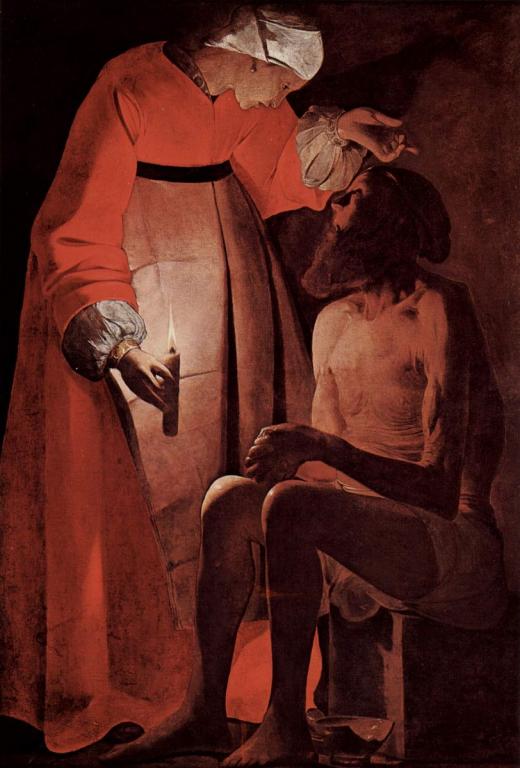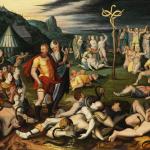The upper hand of power would extinguish the victim. From the totalitarian night of occupied France, the poet René Char recorded: “Light has been banished from our eyes. It’s buried somewhere in our bones. It’s our turn now to hunt for it and put back its crown.”
The powers and dominations torture our eyes into not seeing either suffering or hope, the luminosities of the Cross, amid our thoughtless routines and certainties. Rather, we pretend our neighbor is not bleeding along our way—the unborn, the refugee, the abused, the discarded. We cannot discern the fellow-human in our political opponent or our social rival. We can’t figure out how to balance Catholic piety and a preferential option for the victim, as we face our massive crisis in episcopal (and papal) order.

Seeing Against the Darkness
The whole system of unchecked power, operative both inside and outside of the Church (personally, interpersonally, communally), must be resisted, but we must do so without becoming partisans of some other partial and scapegoating interest.
Thus I think it edifying to share some of the poet René Char’s provocations, having just finished working through his Hypnos (in Mark Hutchinson’s translation), a collection of poetic aphorisms from a member of the Maquis, the French resistance to the Nazi occupation of France.
We live in a time when eros and polity are dying, in Church and world, where hypnotism has seized the soul, as we drown in comfort or the privation of comfort. We are mad and dazed: mindless, heartless, gutless.
Char describes a painting by the great seventeenth-century artist Georges de la Tour. Char knew the painting as The Prisoner, and thus read it hopefully. What he says stands.
We Meant One Thing, God Another
But there is an irony in his ekphrasis that cuts to the bone. We now know that the painting depicts Job Ridiculed by His Wife. I take this personally, and it sums up the world-system of madness catastrophizing under the inscrutable gaze of a good but hidden God—Who is hidden above all in our failures to care for each other, our failures to reconcile, our failures to forge a world hospitable to children.
In his mistaken, yet more deeply true, reading, Char demonstrates the Lutheran principle of sub contrario. The goodness of God works its way into visibility under its opposite. A painting of Job’s mocking wife contains the opposite truth. What’s left to us: to learn faith amid the viscosities and stubborn invisibility of goodness.
This world witnesses common cruelties most intimate, abuse and rapacious control, played over and over in the dark. And yet, no matter how much evil we do, something else is happening. The law of the Cross operates.
Char, Hypnos 178
“The colour reproduction of The Prisoner by Georges de la Tour, which I have pinned to the whitewashed wall of the room where I work, seems, with time, to reflect its meaning back on our predicament. It makes your heart bleed, yet how refreshing it is! For two years now, not one réfractaire [the French who refused to serve as forced labor for the Germans and, fleeing, formed the nucleus of the Maquis] has stepped through that door without his eyes smarting at the evidence of that candle. The woman explains, the prisoner listens. The words falling from this red angel’s earthly silhouette are life-giving words, words which are immediately of help. In the depths of the dungeon, the minutes of tallow light pull at the features of the seated man, diluting them. Thin as a dry nettle, no memory I can see could quicken his withered flesh. The bowl is a ruin. But the billowing robe suddenly fills the entire dungeon. The power of woman’s Word to give birth to the unforeseeable is greater than any dawn.
“My gratitude to Georges de la Tour for mastering the Hitlerian darkness with a dialogue between human beings.”
Resistance and Progress
Imprisoned man awaits the Marian love; imprisoned woman awaits the gentleness of true man, who does not lord it over the ones in his care. Indeed, man and woman each need what the other needs. And every child awaits a safe place, a home that will not house depredation or allow depredation in—safe not through self-segregation, but by incubating engagement in, resistance to, and cultivation of, the world.
Abuse of power poisons everything. It is filth. It creates dungeons that undermine the foundations of the world. It kills eros and polity.
But the mockery of the upper hand knows not what moves in shadow and light: something unforeseeable to our controlling eyes. God resists our pride, forming little intimacies of genuine care beneath the surveillance of the high. We hope against hope in a Father we have done too much to hide. The candle burns down, and darkness asserts itself. But dawn will shake us all.











